|
|
|
Sort Order |
|
|
|
Items / Page
|
|
|
|
|
|
|
| Srl | Item |
| 1 |
ID:
060972


|
|
|
| 2 |
ID:
125907


|
|
|
|
|
| Publication |
2013.
|
| Summary/Abstract |
How are the contours and practices of the state changing under the regime of economicliberalization in India? To address these questions in the context of India, in this essay I turn to the relatively understudied state of Odisha. The most common sites of research about the political economy of globalization in India are the technology clusters around Delhi, Bangalore, and Chennai, and the dynamic spaces of the burgeoning service sector. By analyzing politics in globalizing Odisha, however, we get a different sense of the messy, complicated, and sometimes contradictory politics of globalization in India, as well as how the state is adapting to these changes. The relative success of Odisha in attracting investments in mining and mining-related sectors is due both to the opening of the Indian market generally as well as efforts by the state government to promote industrial investment in these sectors.
|
|
|
|
|
|
|
|
|
|
|
|
|
|
|
|
| 3 |
ID:
087513


|
|
|
|
|
| Publication |
2009.
|
| Summary/Abstract |
In Reorient: Global Economy in the Asian Age, Andre Gunder Frank
reminds us that in the centuries from 1400 to 1700, the Asian power
centers located in the Indian Subcontinent and China accounted
for the lion's share of global GDP, world trade flows, and capital
accumulation.1 The economic dynamics of the heyday of European
imperialism upended that, transferring the locus of power and capital
to Europe, and more specifically England. Railing against the colonial
period's skewed economic dynamics became a motivating force of the
nationalist movement, spurring Indian leaders to demand sovereignty
over decision-making, above all in economic affairs. For roughly three
decades after independence, the Indian state led by Nehru evolved a
foreign economic policy built on the conjoined principles of economic
self-reliance and political non-alignment. From the late 1950s to the
late 1970s, the high walls that came to surround the Indian economy
almost entirely shielded it from the eddies of economic activity across
the globe. India's goal was to undertake industrialization and modernization
without significant foreign intervention or assistance - to
extend the nationalist-era motto of self-reliance or swadeshi into all
realms of development. Nevertheless, capital scarcity made external
assistance necessary, so within this closed economic framework, the
Indian state found it had to interact strategically with both Cold War-era
power blocs, as well as multilateral institutions, when necessity
demanded and opportunity allowed.
|
|
|
|
|
|
|
|
|
|
|
|
|
|
|
|
|
|
|
|
|